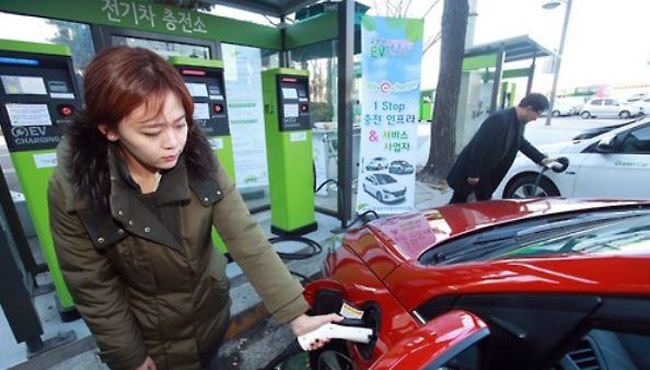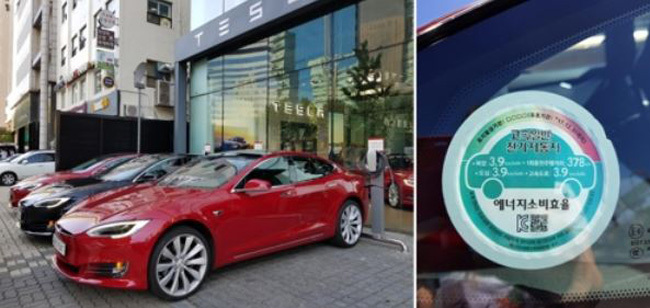South Korea is speeding up its efforts to expand charging infrastructure for electric vehicles, as global carmakers' unveiled road maps for electrification at this year's Frankfurt Motor Show, industry watchers said Friday,
The government is planning to increase the number of fast-charging stations to 3,000 across the country by the end of 2018 from 1,508 at the end of June. It will more than double the number by 2020 to approximately 6,000, Lee Hyung-sup, director of the Clean Air Strategy Division at the Ministry of Environment, said over the phone.
"In the coming years, we will make a bigger effort to increase the number of electric vehicle chargers to help spread the zero-emission car following the Volkswagen Group's diesel emissions scandal two years ago," Lee said.
The aggressive approach is part of the government's planned efforts to reduce the number of diesel-powered vehicles on the streets by 30 percent over the next five years.
It is also in line with the world's leading carmakers' push seen at the Frankfurt auto show that runs through Sept. 24.
Volkswagen, hit hard by "diesel gate" in 2015, announced Wednesday it will thoroughly update its vehicle range by 2020 and expand into important segments though it will still stick with diesel engines.
"In 2025, the Volkswagen Brand will already be offering 23 all-electric vehicle models and invest 6 billion euros ($7.1 billion) in electric mobility over the next five years," the group said in a statement.
 |
In this Yonhap file photo, a woman charges her electric car using a charger set up in Gwanghwamun, central Seoul. (Yonhap) |
BMW and Mercedes-Benz also outlined plans to strengthen their electric car lineup as they see an electrified vehicle as the mainstream car in the future.
BMW unveiled the BMW i Vision Dynamics, an all-electric four-door coupe concept, that will beef up its electric lineup along with the i3 and i8. Mercedes-Benz revealed the Concept EQA, the first all-electric concept in the compact segment, after showcasing a pure electric SUV concept at the Paris motor show last year, according to the companies.
Meanwhile, the number of the country's slow chargers is also set to rise significantly for years to come from 1,606 at the end of June due to eased regulations and the government's subsidies ranging from 17-21 million won ($15,000-$19,000) and tax benefits for electric cars.
"To help expand slow chargers as well, the government has recently eased regulations to allow all buildings with space for parking and chargers and maintenance personnel to set one up," the official said, without giving the target number of slow chargers that can be built under the revision.
Previously, residential and office buildings with a parking lot for more than 100 cars were only allowed to have a set of slow chargers. Fast chargers are largely available at places like hotels, large discount store chains and highway rest stops.
Given the domestic demand for EVs far exceeds the supply, local carmakers can receive government subsidies so they can produce more electric cars, the environment ministry said.
The demand for electrified cars is estimated to jump to 16,659 in 2017 from 9,052 a year earlier. But the supply of EVs stayed at 65 percent of what consumers wanted last year and is projected to hover around 44 percent of requirements this year, it said.
Charging infrastructure is still quite a mountain to climb. But improving infrastructure and increasing the number of electric cars, domestic or international, at showrooms will drive up sales of electric models in the long term, industry insiders predicted.
In the past several years, Hyundai Motor Co. and its affiliate Kia Motors Corp., which together form the world's fifth-biggest carmaker by sales, saw the sales of their electric models -- the Ioniq from Hyundai and Ray mini car and Soul boxcar from Kia grow steadily.
 |
In this photos taken on Sept. 13, 2017, Tesla Motors` Model S 90D all-electric models (L) are charging at the US carmaker`s showroom in Cheongdam, southern Seoul. (Yonhap) |
Hyundai sold 9,661 Ioniqs in the January-August period, up 68 percent from 5,764 units for the whole of 2016.
Among foreign carmakers, Tesla Motors Inc. was relatively quick to respond to a growing local appetite for EVs. It entered the Korean market in March and has set up two showrooms in Seoul and Hanam, just east of Seoul.
The US electric carmaker is aggressively establishing charging stations exclusively used for its own electric vehicles -- Model X, Model S and Model 3. It has built seven rapid chargers, or "superchargers" and 93 slow-charging stations, or "destination chargers," and will continue to add more to woo local customers.
"Tesla made inroads into Japan five years ago but the number of superchargers there stands at 15. It means South Korea is a market with a high growth potential for electric carmakers," a Seoul-based spokeswoman for Tesla said by phone. (Yonhap)









